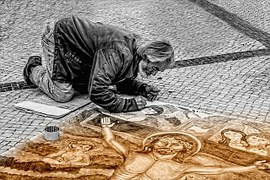Photo: Pixabay
I'm a person who likes to get things done. Before I go to bed I think of the things I'd like to do the next day, and when I wake up I consider what I'd like to accomplish that day and when. There's nothing wrong with the pleasure of seeing the results of one's efforts. But there's another way I think is better. The difference between the two attitudes toward work shows up in our impacts on the environment.
Phil, a friend of mine, used to visit a monastery every month to take classes. One day as he approached the classrooms at the top of the hill he encountered Br. Joe. Br. Joe was around eighty years old, and he was painting the railing along the stairs Phil was climbing. Brushing slowly, Br. Joe caressed the railing, covering it lovingly with fresh color, pausing periodically to consider his work. They had never met, but Br. Joe beamed as he saw Phil coming. He asked Phil what he was studying, where he came from, how things were going for him. He delighted in his time with Phil, as did Phil. When my friend noted it was time for class, Br. Joe bade him farewell and returned to his painting...a loving stroke of the brush...pause...loving stroke...pause...
Br. Joe worked, and he worked well. He loved what he was doing, even though it was a simple task that probably could have been done faster if the monastery had contracted the work out. However, the monks knew that work done lovingly and attentively, however simple and mundane, had value. Getting the railing painted, while important, mattered less than painting it well. Good work meant providing someone the opportunity to contribute and to experience the joy that comes from giving oneself totally to the moment, whether painting or talking to Phil. They knew that loving attention at every moment produces good results, whether less rust or enriching someone's day.
When I work in order to check another goal off my list, I do indeed gain satisfaction. But when I accomplish the task, the joy lasts only a few minutes. Then I'm off to the next item on my list. In between I experience tension and a subtle anxiety - will I have enough time to do all I want to get done today? Am I doing the right thing or could I spend my time doing something else? What if I don't get everything done? So, I go from momentary joy to momentary joy, with long periods of subtle stress in between.
Somehow I don't think Br. Joe stressed out. Although there are several reasons we easily could point to, fundamentally I think it was because he knew that it was how he did the work that mattered. The doing of the work, not the accomplishing of the task, brought fullness and meaning. So, he spent all his time being nourished by what he was doing instead of being drained by the pressure to complete an unending, demanding list of tasks.
When life consists of accomplishing goals, we rate ourselves by whether or not we have made our objectives, instead of asking whether or not our environment is richer for our being in it. We soon do all we can to control our circumstances so that we might achieve, finding ways enabling us to control others so that they help us meet our goals. Yes, organization is necessary. But, control generally is not.
Loving painting leads one to engage lovingly with all one encounters, whether human or nonhuman. The need to control leads to oppression and injustice, rationalizing extracting whatever we can from others. On the other hand, loving engagement leads us to the desire to cooperate, to asking how we can contribute to the good of the other.
Our technology today uses toxic chemicals and fossil fuels to produce commodities that we then throw out, poisoning the poor who live near or on our dumps and contaminating the aquifers that supply our wells. To obtain energy to fuel our growth we tear down mountains, destroying their streams and the communities who live there. Yet spiders produce filaments stronger than Kevlar, using only the sun's energy and nontoxic materials. Trees pump water hundreds of feet in the air to their leaves without any fossil fuels. Spiders and trees work well - they collaborate with their environment and don't despoil it. They design with nature, not against it.
Br. Joe considered Phil's visit a marvelous opportunity, not an obstacle he needed to overcome so he could finish the railing. Perhaps if we really learned how to paint, we might learn to delight in our nonhuman neighbors rather than control them. What might our world look like then?
More about this author
Certificate in Contemplation and Creation Care
Center for Religion and Environment at Sewanee: The University of the South

